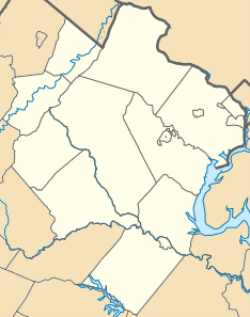Hugh Mercer Apothecary was an apothecary founded by Hugh Mercer in the mid-18th century. Mercer was a doctor who fled Scotland after the Battle of Culloden. He travelled to Pennsylvania, where he met Colonel George Washington during the French and Indian War and later moved to Fredericksburg, Virginia, on Washington's advice to practice medicine and operate an apothecary.
Hugh Mercer Apothecary | |
 Hugh Mercer Apothecary Shop | |
| Location | 1020 Caroline Street, Fredericksburg, Virginia |
|---|---|
| Coordinates | 38°18′0″N 77°28′13″W / 38.30000°N 77.47028°W |
| Part of | Fredericksburg Historic District[1] (ID71001053) |
| Designated CP | September 22, 1971[2] |

The building that housed the apothecary has been restored by Preservation Virginia[3] (formerly known as the Association for the Preservation of Virginia Antiquities) to demonstrate 18th Century medical treatments.[4] It also includes a small exhibit on Mercer's life and contributions to the American Revolutionary War.[5]
In mid-2012, Preservation Virginia signed an agreement passing ownership to the "Washington Heritage Museums" group beginning in 2013.
The museum is located at 1020 Caroline Street in Fredericksburg, Virginia.
Sources
edit- ^ "Fredericksburg Historic District National Register Nomination" (PDF). Virginia Department of Historic Resources. Retrieved June 15, 2011.
- ^ "National Register Information System". National Register of Historic Places. National Park Service. March 13, 2009.
- ^ "Hugh Mercer Apothecary". APVA Preservation Virginia. Archived from the original on March 6, 2008. Retrieved March 4, 2008.
- ^ Jerry Haines (June 6, 2004). "A Fine Time, by George". The Washington Post. Retrieved March 4, 2008.
- ^ Richard Ruda (April 14, 2000). "Weekend Excursion; A Genteel Land of War and Heroes". The New York Times. Retrieved March 4, 2008.
External links
edit


